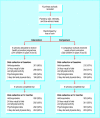Randomised controlled trial of primary school based intervention to reduce risk factors for obesity
- PMID: 11691759
- PMCID: PMC59381
- DOI: 10.1136/bmj.323.7320.1029
Randomised controlled trial of primary school based intervention to reduce risk factors for obesity
Abstract
Objective: To assess if a school based intervention was effective in reducing risk factors for obesity.
Design: Group randomised controlled trial.
Setting: 10 primary schools in Leeds.
Participants: 634 children aged 7-11 years.
Intervention: Teacher training, modification of school meals, and the development of school action plans targeting the curriculum, physical education, tuck shops, and playground activities.
Main outcome measures: Body mass index, diet, physical activity, and psychological state.
Results: Vegetable consumption by 24 hour recall was higher in children in the intervention group than the control group (weighted mean difference 0.3 portions/day, 95% confidence interval 0.2 to 0.4), representing a difference equivalent to 50% of baseline consumption. Fruit consumption was lower in obese children in the intervention group (-1.0, -1.8 to -0.2) than those in the control group. The three day diary showed higher consumption of high sugar foods (0.8, 0.1 to 1.6)) among overweight children in the intervention group than the control group. Sedentary behaviour was higher in overweight children in the intervention group (0.3, 0.0 to 0.7). Global self worth was higher in obese children in the intervention group (0.3, 0.3 to 0.6). There was no difference in body mass index, other psychological measures, or dieting behaviour between the groups. Focus groups indicated higher levels of self reported behaviour change, understanding, and knowledge among children who had received the intervention.
Conclusion: Although it was successful in producing changes at school level, the programme had little effect on children's behaviour other than a modest increase in consumption of vegetables.
Figures
Comment in
-
School based programmes on obesity.BMJ. 2001 Nov 3;323(7320):1018-9. doi: 10.1136/bmj.323.7320.1018. BMJ. 2001. PMID: 11691747 Free PMC article. No abstract available.
-
Randomized controlled trial of primary-school based intervention to reduce risk factors for obesity.J Pediatr. 2002 May;140(5):633-4. J Pediatr. 2002. PMID: 12096710 Clinical Trial. No abstract available.
References
-
- Dietz WH. Childhood obesity. In: Bjorntorp P, Brodoff BN, editors. Obesity. Philadelphia: Lipincott; 1992. pp. 606–609.
-
- Parcel GS, Simons-Morton BG, O'Hara NM, Baranowski T. School-based programmes to prevent or reduce obesity. In: Krasnegor NA, editor. Childhood obesity: a biobehavioral perspective. Caldwell, NJ: Telford; 1988. pp. 143–147.
-
- Reniscow K. School-based obesity prevention. Ann N Y Acad Sci. 1993;699:154–156. - PubMed
Publication types
MeSH terms
LinkOut - more resources
Full Text Sources
Medical

